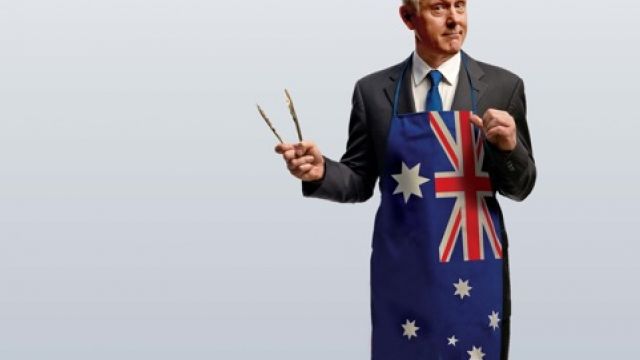AUSTRALIA DAY: THE PLAY
Funny man Jonathan Biggins is going ‘straight’. The star of the highly successful Wharf Revue has penned a play about Australia’s national day. The Melbourne Theatre Company premieres the production in April before it touches down in Canberra and Sydney later this year.
Frank Hatherley shared a coffee with Mr Biggins. But first here’s a sneak preview. The setting is an Australia Day Committee meeting in a small coastal town...
Brian: Item six. The sausage sizzle.
Wally: What about it?
Brian: Councillor McInnes has a few queries.
Wally: Now there’s a surprise.
Helen: I was just thinking that a sausage sizzle is a bit monocultural.
Wally: Mono-what?
Helen: Are we reflecting the cultural diversity of the shire?
Wally: What’s more Australian than snags on a barbecue? You think in China on Chairman bloody Mao Day they serve up pavlova?
Helen: This is a country of many cultures, Wally – not everyone, thank God, looks and thinks like you. We should be serving kosher food, vegetarian, Asian ...
Marie: (to Chester) Would you like us to do some satay sticks?
Robert: We can’t serve satay, there’s the issue of nut allergies.
Brian: Fried rice?
Chester: Why does everyone look at me as soon as we start talking about minorities? No offence, Marie, but you’re the endangered species.
Marie: What do you mean?
Chester: Well they’re not smuggling boatloads of CWA ladies onto Christmas Island, are they? Helen’s right – the demographic is changing.
Wally: And if the demographic doesn’t like a sausage they can piss off home.
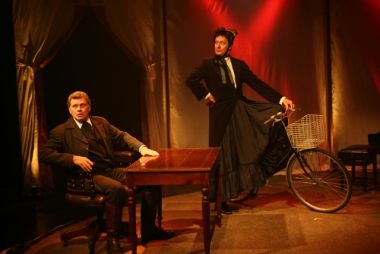 Jonathan Biggins is one-third of a 21st century Australian theatre tradition. Along with Drew Forsythe and Phillip Scott, he has co-written and co-performed the Sydney Theatre Company’s hugely successful annual Wharf Revue since 2000.
Jonathan Biggins is one-third of a 21st century Australian theatre tradition. Along with Drew Forsythe and Phillip Scott, he has co-written and co-performed the Sydney Theatre Company’s hugely successful annual Wharf Revue since 2000.
Now he’s written his first ‘straight’ play. Well, not too straight — it’s certainly a comedy, but there are no songs and no tag lines. A co-production between the STC and the MTC, it’s directed by the esteemed Richard Cottrell.
We meet at The Bean, most venerable of the string of coffee bars along (inner city Sydney) Rozelle’s Darling Street. It’s his ‘local’ and the tattooed waitress immediately delivers his espresso.
Tall and greying, Biggins is cheerful behind his trademark round spectacles. “It’s very exciting,” he says about his Australia Day, soon to begin Melbourne rehearsals, “if a little nerve-wracking.”
Where had he got the idea for the play?
“The Australia Day Council of NSW has this programme where they send out ‘ambassadors’ to all the regional centres. I’ve spent several years being an Ambassador. You assist the local organising committee, give a speech at the Citizenship Ceremony, and attend events.
“My attitude towards Australia Day was always fairly ambivalent. But then when I actually went out and did it I was very taken by how committed they are. My play emerged out of these organising committees.
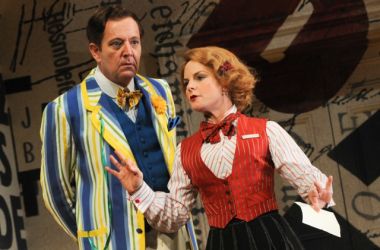 “I do find committees a good source for comedy. There’s great dynamics in a committee. It’s a bit difficult for a director to make it visually interesting but that’s his problem.
“I do find committees a good source for comedy. There’s great dynamics in a committee. It’s a bit difficult for a director to make it visually interesting but that’s his problem.
“The citizenship ceremonies are very moving, too. You met all these people who really want to come here. They obviously see something in being Australian we might be cynical about. We’re always whinging. That’s another thing I was trying to get over in the play: don’t forget how bloody lucky we all are.”
He’s warming to it. “When did Australia turn into a nation of whingers? When is enough going to be enough for you? Really, get over yourself!” Other coffee sippers look towards us.
“Once you move beyond metropolitan passport control you realise how veneer-thin the layers of civilisation can be — advances against racism and that sort of stuff. Why did they vote for Pauline Hanson? Not that they’re red necks, it’s just a very different kind of Australia from the inner-city, bleeding-heart liberal ‘elite’.
“I think the whole political debate in the country, the civic debate, has deteriorated, followed the American path, and I don’t think it’s very healthy for democracy. The media are often to blame.
“I actually had a letter in the Herald today.” And, indeed, on the Opinion Page a ‘Jonathan Biggins, Rozelle’ complains that the calendar of the press gallery ‘is permanently set to Groundhog Day’.
“The press gallery in Canberra is dysfunctional and should be removed,” he says hotly. “They’re too tightly wound up with the politicians – the contacts, the anonymous leaks. They set the agenda, not the government – I didn’t vote for the press gallery, I voted for the government.” He smiles, a little sheepishly. “So there’s a bit about that in the play, too...”
He won’t have a second coffee. “That one will keep me going all day,” he assures me. I change tack, ask about his first contact with theatre.
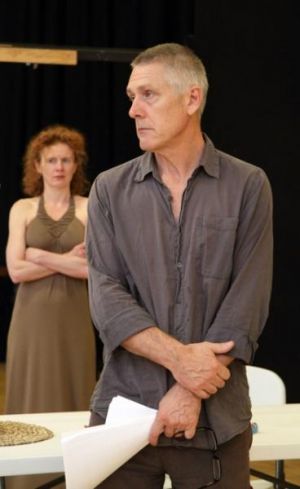
“I come from Newcastle,” he says, “which was a great place to grow up. I would have been about 11 when I started at the Young People’s Theatre. This was an independent company run by Bill and Betty Ford, a couple of old-style theatre practitioners. Bill Ford wrote and pinched children’s shows — fairy stories, pantomimes, The Wizard of Oz.
“They taught drama on Saturday morning and put on shows at the local theatre. They built their own theatre, and it grew and grew, then it burnt down and they built it again, and it’s still going. They’ve had hundreds of kids.
“Kids do everything with adult supervision. You build the shows, stage manage them, help with costumes, you do the lighting –– it’s a fantastic introduction to theatre. Every weekend you have to turn up.
“I went to uni in Newcastle [studying Drama and English]. They brought in a professional director to do a main stage show. The first one was Aarne Neeme and he said ‘if you’re ever thinking about making a career of it give me a call’. A year later he became the Artistic Director of the Hunter Valley Theatre Company, so I joined as a full time actor.
“It was the first regional professional company in Australia [formed in 1976], an ensemble of six or seven actors. We worked our butts off for two years. We’d do a three or four week season of a play and as soon as it opened we’d immediately start rehearsing the next one. That really was my drama school.”
Were you writing anything at all?
“Not really. But I was in a band with Steve Abbott [The Sandman]. He went on to form the Castanet Club. There were always things happening in Newcastle: the rents are cheaper, there’s a bit more space and you’re away from Sydney. When the Castanets came to Sydney they had this worked-up full show that seemed to burst out of nowhere. People said ‘where the hell have these people been?!’.
Biggins left Newcastle to become an actor with jobs at the State Theatre of South Australia, the Belvoir, Griffin and Q Theatre in Sydney, and the Melbourne, Sydney and Queensland Theatre Companies. He played Gilbert and Sullivan for Queensland Opera, the State Opera of South Australia, Victoria State Opera and Opera Australia.
Recently he toured 180 performances as Peter Sellers in Ying Tong – A Walk with the Goons (2007-8) and played the lead in Tom Stoppard’s Travesties (2009) for the STC. But, there were years when acting would not have paid the bills.
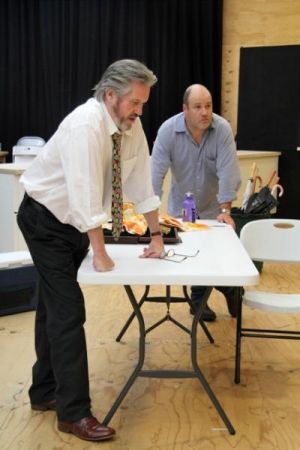
“It’s only been my ability to write stuff that has kept me going,” he says. “If I’d been waiting by the phone as just an actor I’d still be waiting.” In 2000, the first Wharf Revue changed everything. He was part of a team that soon cornered the market in theatre sketches.
“We’ve tried to find other people but it’s difficult. There are plenty of sketch writers for TV. There’s a stable of people who write for Good News Week, and there’s the Chaser boys, I suppose...” He doesn’t sound too convinced.
“Look, you can only do a television sketch once. We write theatre sketches that have to last three or four months, that you can do over and over again. TV chews things up voraciously.
“The hardest thing about writing a sketch is the last line, the tag. That can be our nightmare. But on television you don’t really need tags. Monty Python wanted to end the tyranny of the tag so they went to ‘something completely different’. We often end with a song. That’s always good. Music gives it a natural conclusion.
“I think sketch writing is very good discipline, as is lyric writing. It makes you realise the importance of every single word. Most plays by young playwrights suffer from being overwritten. The best skill, particularly in comedy, is to make it as succinct as possible, taut and sharp. I look at our old sketches: we’re much more ruthless with the blue pen now.”
And now he’s moving from sketches to full-length plays, a whole different world of comedy.
“I said to Richard Cottrell, ‘it’s a comedy, so let’s have a short rehearsal period, it needs an audience, let’s get it up quickly’. Richard said, ‘oh no, we need the extra weeks to uncover the psychological depths’. I said, ‘I don’t think there are any’. He said, ‘I think you could be surprised’.
“So maybe I will be.”
Season Details
Arts Centre, Melbourne: April 21 to May 26, 2012.
Riverside Theatres, Parramatta: August 22 – 25, 2012.
Canberra Theatre Centre: August 29 to September 1, 2012.
Drama Theatre, Sydney Opera House: September 7 to October 27, 2012.
Images: Geoff Morrell; Drew Forsythe and Jonathan Biggins in STC’s The Wharf Revue 2011 – Debt Defying Acts! Photographer: Tracey Schramm; Jonathan Biggins & Rebecca Massey in Sydney Theatre Company’s TRAVESTIES. Photographer: Heidrun Löhr, and Rehearsal images: Alison Whyte and Geoff Morrell & Peter Kowitz and David James. Photographer: Pam Kleemann.
Subscribe to our E-Newsletter, buy our latest print edition or find a Performing Arts book at Book Nook.

